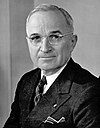Alfred Schindler (industrialist)
Alfred Schindler | |
|---|---|
 | |
| U.S. Secretary of Commerce Acting | |
| In office September 20, 1946 – October 7, 1946 | |
| President | Harry S. Truman |
| Preceded by | Henry A. Wallace |
| Succeeded by | W. Averell Harriman |
| U.S. Under Secretary of Commerce | |
| In office 1945–1946 | |
| President | Franklin D. Roosevelt Harry S. Truman |
| Preceded by | Wayne Chatfield-Taylor |
| Succeeded by | William Chapman Foster |
| Personal details | |
| Born | 1894 |
| Died | January 2, 1987 (aged 92) St. Louis, Missouri |
| Political party | Republican |
Alfred E. Schindler (1894 – January 2, 1987)[1] was an American industrialist who served as the acting secretary of commerce under President Truman.
Career

Schindler served as the head salesman for the Ralston Purina Company of St. Louis, Missouri before retiring in 1941. He became chief of the consultant division of the Defense Plant Corporation where he headed a staff of business men and industrialists, arranging for the building of thousands of war plants between January 1942 and May 1943. He also served as a member of the National Civilian Defense Committee and helped to organize civilian defense in the midwest.[2]
In April 1945, President Franklin D. Roosevelt appointed Schindler to replace Wayne Chatfield-Taylor as the under secretary of commerce. Schindler, a Republican, was an old friend of Roosevelt's commerce secretary Henry A. Wallace (Roosevelt's vice president of the United States from 1941 to 1945 before Truman) and was serving as the executive director of the for the Committee for Economic Development in the St. Louis area.[2][3][4] He had also served as a special assistant to Jesse H. Jones, the former secretary of commerce and Federal Loan Administrator.[5] In September 1946, President Truman fired Wallace for delivering a speech urging conciliatory policies towards the Soviet Union,[6] and asked his "personal friend" Schindler to serve as acting secretary,[7] although Schindler had been planning to retire from the government service and enter business on the West Coast.[5] Schindler felt that "the Department of Commerce should be the business man's home in Government."[5]
Although considered the most likely successor to Wallace as commerce secretary,[7] Truman appointed W. Averell Harriman as appointed as secretary of the treasury. After Harriman took office, he persuaded Schindler to stay in his role for a few months before returning to private industry.[8] Truman appointed New York businessman William Chapman Foster as Schindler's successor as under secretary,[9] and Schindler returned to St. Louis.[10]
In 1947, he was elected president of the National Federation of Sales Executives and in 1948, he was elected to their board of directors. Schindler gave talks stressing public service and free enterprise.[11] In 1961, he donated his papers to the Harry S. Truman Presidential Library and Museum.[12]
Personal life
Schindler died of infirmities at his home in St. Louis on January 2, 1987, and his funeral was held at Unity Christ Church in Clayton, Missouri. He was survived by his wife Katherine Schindler.[1]
References
- ^ a b "Albert Schindler, 92; Former Truman Official". St. Louis Post-Dispatch. 4 January 1987. p. 51. Retrieved 20 June 2020.
- ^ a b TIMES, Special to THE NEW YORK (12 April 1945). "Taylor Resigns Commerce Post; Named Wallace Aide". The New York Times. Retrieved 20 June 2020.
- ^ Waggoner, Walter H. (21 March 1946). "ASKS YEARLY PAY, SHARING OF PROFITS; Schindler, Aide of Wallace, Says Production Incentive Must Include Workers Incentive Unit to Get Plan Worker Security Is Urged". The New York Times. Retrieved 20 June 2020.
- ^ Waggoner, Walter H. (23 January 1946). "SHARP SPLIT ARISES ON SMALL-LINES AID; Revealed at Congress Hearing as Wallace, Schindler Seek Expanded Commerce Plan RFC POWER IS CRITICIZED Secretary Calls for Three New Assistant Secretaries at Salaries of $10,000 Each". The New York Times. Retrieved 20 June 2020.
- ^ a b c TIMES, Special to THE NEW YORK (21 September 1946). "SCHINDLER FILLS IN AS COMMERCE HEAD; Under-Secretary Tells Truman He Will Serve as Long as Chief Executive Wishes". The New York Times. Retrieved 20 June 2020.
- ^ "Henry Agard Wallace, 33rd Vice President (1941-1945)". Senate.gov. Senate Historical Office. 2017-05-05. Archived from the original on 2019-03-25. Retrieved 2019-03-25.
- ^ a b TIMES, Special to THE NEW YORK (21 September 1946). "LEADS FOR WALLACE POST; Schindler Mentioned as Most Likely Successor". The New York Times. Retrieved 20 June 2020.
- ^ TIMES, Special to THE NEW YORK (9 October 1946). "Schindler Sticks to Harriman". The New York Times. Retrieved 20 June 2020.
- ^ "W.C. Foster Gets Commerce Office; in Commerce Post". The New York Times. 30 November 1946. Retrieved 20 June 2020.
- ^ "Foster Takes Commerce Post". The New York Times. 6 December 1946. Retrieved 20 June 2020.
- ^ "Schindler Outlines 5 Guideposts For Those in Selling Profession; Under-Secretary of Commerce Also Suggests at Boston Parley That Aids Stress Public Service, Product, Free Enterprise". The New York Times. 11 January 1948. Retrieved 20 June 2020.
- ^ "Truman Library Gets Files". The New York Times. 5 February 1961. Retrieved 20 June 2020.


